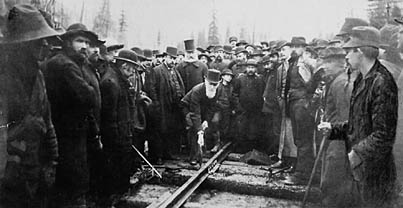Epilogue: The Student and the Scandal
Epilogue: The Student and the Scandal McGill University
User Tools (skip):
Epilogue: The Student and the Scandal

Donald Smith drives the last spike on the Canadian Pacific Railway in 1885.
National Archives of Canada
There may be some debate about who is considered to be McGill's most famous law graduate. Perhaps Canadian Prime Ministers Sir Wilfrid Laurier, Sir John Abbott or political activist and poet F.R. Scott.
There is no contest, however, as to who is McGill's most influential law student. Unfortunately, his name seems to have disappeared into what historians call the mists of history (when their researchers can't find the answer). No doubt, too, he did not want to publicize what he had done to merit such fame - for it was he who directly caused the resignation of Canada's first prime minister, Sir John A. Macdonald, and the fall of his Conservative government in November 1873.
The story is a fascinating part of Canadian history.
To fulfill a promise Macdonald made to British Columbia in 1871 to entice the province to join Confederation, a railway was to be built within ten years across Canada stretching to Vancouver. It seemed monumentally ambitious - or foolhardy - for a nation of three and a half million people to embark on a project expected to cost at least $100 million, but Macdonald knew that annexationists in the United States had their eye on the vast lands between Upper Canada and the Pacific. After the 1867 purchase of Alaska, U.S. Secretary of State W.H. Seward predicted at a speaking engagement in Boston that the whole continent "shall be, sooner or later, within the magic circle of the American union."
A wary Macdonald wanted a Canadian route for the Pacific Railway, but had awarded the charter for its construction to Montreal business tycoon Sir Hugh Allan, the strongest of the three contenders for the job. However, Allan wanted the rail line to go through the United States as a concession to a friend and fellow investor, the American Jay Cooke.
Macdonald vehemently opposed the plan, and so Allan immediately began using large funds and gifts of stock to buy off influential businessmen and the press in order to have the American route accepted. Allan spent over $365,000 on the campaign. As a matter of course, he had also helped the Conservative Party in the election of September 1, 1872, apparently providing Macdonald with $35,000, Georges-Étienne Cartier with $50,000 and Hector Langevin with $115,000. Macdonald, Cartier and Langevin were each Conservative organizers in a number of constituencies and used the monies for electoral purposes.
Six days before the election, Macdonald, who had overspent, sent a desperate telegram to Allan: "I must have another $10,000. Will be the last time of calling. Do not fail me. Answer today." Allan kept the telegram in his files and then gave it to his lawyer, John Abbott, for safekeeping, and no doubt for future use to put pressure on Macdonald if the need were ever to arise. Abbott had a law office but was also Dean of Law of McGill (1855-1880). The Liberals, smelling a scandal, began assembling documents and a McGill law student who worked in Abbott's law office stole the telegram which was eventually produced in the House of Commons by Lucius Seth Huntingdon, the Liberal member for Stanstead.
A vote of confidence in the House followed on November 5, 1873, and the government fell. Donald A. Smith, the independent member from Selkirk, Manitoba, gave the deciding vote after letting the government dangle in the wind by concealing his intentions during the debate, which raged for six days. The resulting general election, on January 22, 1874, was fought on the issue of the "Pacific Scandal" and Macdonald and the Conservatives lost.
The various players in the epic eventually rose from the ashes. Macdonald became Prime Minister again in 1878 and died in office. The railway was built through Canada and the Dominion was saved. Smith, who supported Macdonald in the election of 1878, backed the Canadian Pacific Railway and as an influential member of the consortium which completed the project, drove in the last spike on November 7, 1885. He made a fortune, was knighted in 1886 and became Lord Strathcona in 1897. In 1891, Sir John Abbott became Prime Minister of Canada for a year on Macdonald's death.
Sir Hugh Allan also made money out of the railway - and everything else he touched. His large home, known as "Ravenscrag," is still seen today at the top of Montreal's McTavish Street. It was donated by his heirs in 1940 to the adjacent Royal Victoria Hospital (which Smith helped establish) and is the centrepiece of the Allan Memorial Institute, a psychiatric treatment and research facility. Hector Langevin returned to Parliament as a cabinet minister in 1878 and was knighted by Queen Victoria in 1881.
Thus, in the end, all the rascals prospered. The only one who seems to have been unrewarded was McGill's most famous law student, whose identity is still unknown.
William Tetley, QC, practised law from 1952 to 1970, when, after two years as a member of the Quebec National Assembly, he was appointed to the cabinet of Liberal Premier Robert Bourassa. Since 1976, he has taught at McGill's Faculty of Law. Reach him at william.tetley@mcgill.ca.


